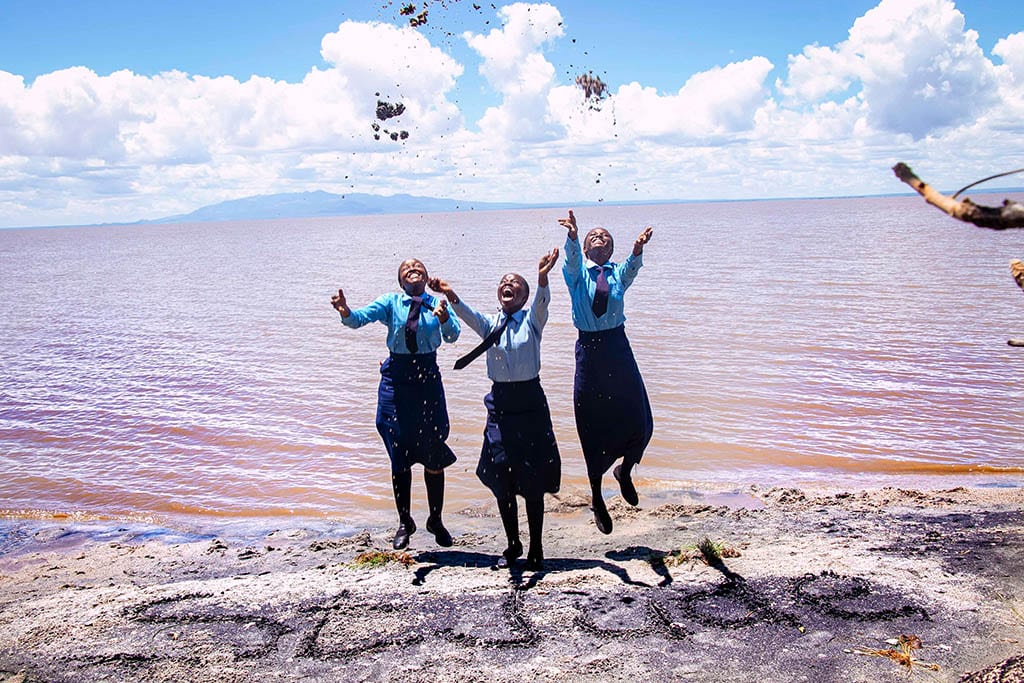Judica’s story of transformation runs parallel to St Jude’s own. When Judica started at St Jude’s in 2003, there was one campus and less than 100 students. Today, Judica visits as a successful banker and St Jude’s comprises three schools, three campuses, a ground-breaking graduate program and more than 800 alumni.
In 2003, Judica was just eight years old. One day, her brother Ezekiel lifted her onto his motorbike and brought her to St Jude’s for a Student Selection Day. Judica’s family knew that the school was offering free, quality education to students from poor families and hoped she would receive a scholarship too.
“There were so many of us at home – we were nine children and I am the ninth. You can imagine it – all of us in the same house – and life was not so good. My parents were farmers, but they were farming on a very small scale. The harvests were little and it wasn’t enough,” she recalls.
When Judica was offered a St Jude’s scholarship it was a huge relief.
Each day, Judica walked to school. While the school has 26 buses today, at that stage there was only one. Since 2004, all students and staff have enjoyed daily hot lunch at school, but in those early days Judica and her classmates walked home for lunch as the school didn’t yet have a kitchen!
Since then, a lot has changed for St Jude’s and for Judica. “If you had asked me what I wanted to be when I started at school, I would have said, ‘A policewoman’,” she laughs. When Judica reached secondary school, however, she discovered a talent for business.
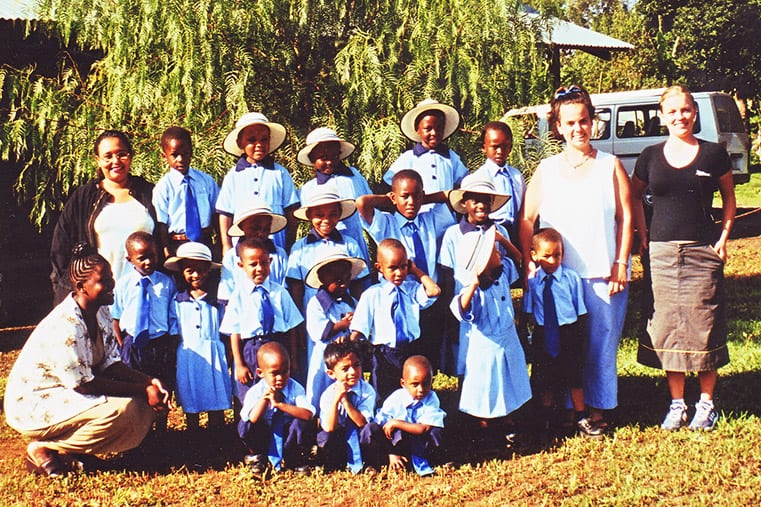
It wasn’t just her career aspirations which changed as Judica progressed through St Jude’s. Her story changed as she sought leadership opportunities and worked towards her future. Judica moved from primary school to O Level (the first four years of secondary school) and then A Level (the final two years of secondary school). Voted Head Girl in both O Level and A Level, Judica gained opportunities to practise her role as a future leader. In her final school years, she studied book keeping, commerce and accounting.
In 2015, after 13 years of free education, Judica completed secondary school with the inaugural graduating class. She remembers week-long celebrations with crowds of supporters arriving from all over the world to be there.
Ever a pioneer, Judica was one of the first students to take part in the Community Service Year (CSY). The CSY is the first year of the Beyond St Jude’s Program (BSJ) for Form 6 graduates. During the CSY, participants volunteer their time as teachers in government schools or in non-teaching placements throughout St Jude’s campuses. Judica taught book keeping and commerce at a government secondary school. “It was the best moment of my time with St Jude’s as I was giving back to the community,” she says.
Judica’s year of volunteering made a big impact on her students. She explains, “In local schools most students don’t make it to A Level, but most of my students passed and reached A Level. Many even made it to college, so I thank St Jude’s for that.”
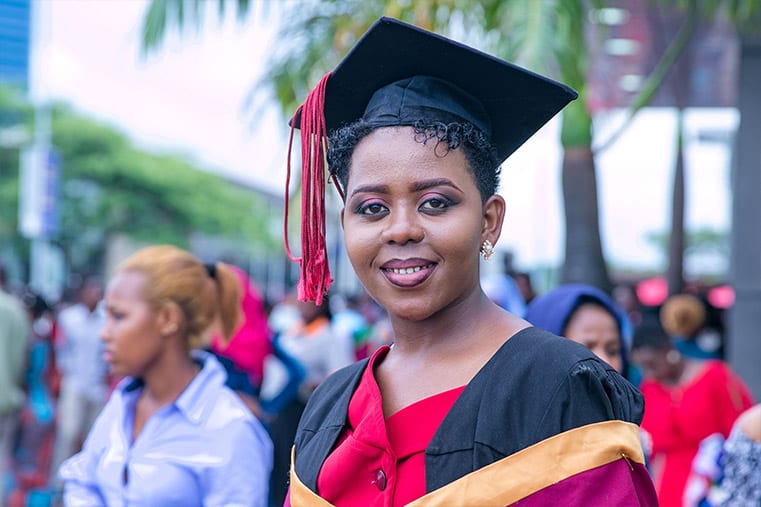
Soon it was time for Judica to begin her degree at the University of Dar Es Saalam, supported by Beyond St Jude’s. “BSJ helped with the whole process of applications for universities. They visited us at university to see how we were doing. That was really encouraging, to know that we had people who really cared about us, even after we finished school.”
In 2019, Judica proudly graduated from university with a Bachelor of Commerce in Banking and Financial Services and her family and BSJ representatives made the trip to celebrate. “It was so exciting,” she shares.
After university, Judica began working. “I was lucky because I got my first job just one week after I graduated. I was offered a job in one of the commercial banks as a Bank Officer,” she smiles. In a country where youth unemployment is high, this is a testament to Judica’s drive and great education.
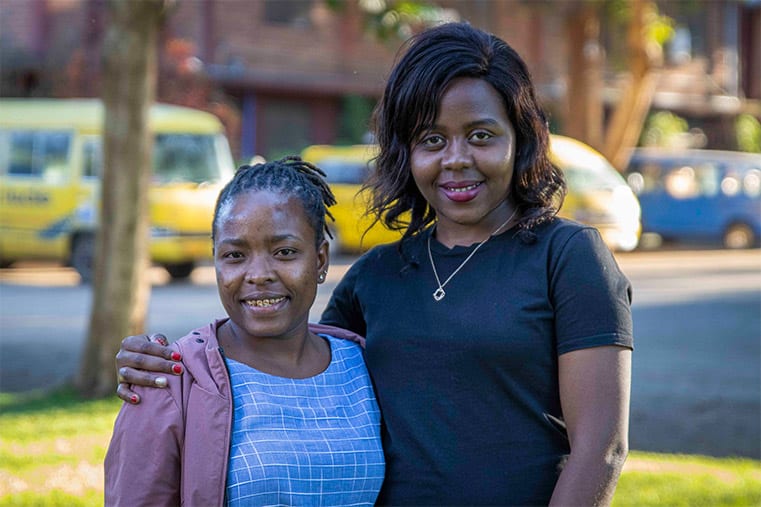
After a year, an opportunity arose at the prestigious Bank of Tanzania, where Judica happily works today. With her salary, Judica lives independently and provides her family financial support. Her older siblings are working and things have improved for her parents. “They are living comfortably now. My parents are still farming, yes, but on a larger scale, and it’s enough,” Judica reports.
In just eight months, Judica has grown into her new role, which takes her all over Tanzania. She is based in Arusha but also travels to Zanzibar and the capital, Dodoma, for work. Despite this busy schedule, Judica is happy to make time for her school, organising a trip home to film an interview for St Jude’s.
Just as St Jude’s been transformed since its beginnings, so too has Judica. With a free, quality education and her commitment to making the most of each opportunity offered to her, Judica has realised the St Jude’s vision. Where a bright but poor student once stood, now stands a young leader, fighting poverty in Tanzania.
The School of St Jude is blessed with many alumni coming back to work at the school as employees. Whether it be in classrooms, sports grounds or offices, the returning alumni are supporting the next graduates of St Jude's.
The school recently welcomed back Daudi, Innocent D and Innocent M, who are now full-time employees within St Jude’s Head Office.
They all received free, quality education from Standard 1 to Form 6 and then were supported through higher education by the Beyond St Jude’s (BSJ) Program. Now, they wish to give back to the school’s community and share their stories of transformation.
In Tanzania, there are three stages of school; seven years of primary school from Standard 1 to 7, then four years of secondary school from Form 1 to 4 in Ordinary level (O Level) studies, and finally the final two years of secondary school, Form 5 and 6 in Advanced Level (A Level) studies.
The BSJ Program supports secondary graduates to undertake a Community Service placement and then provides them with the funding and support for their first higher education qualification.
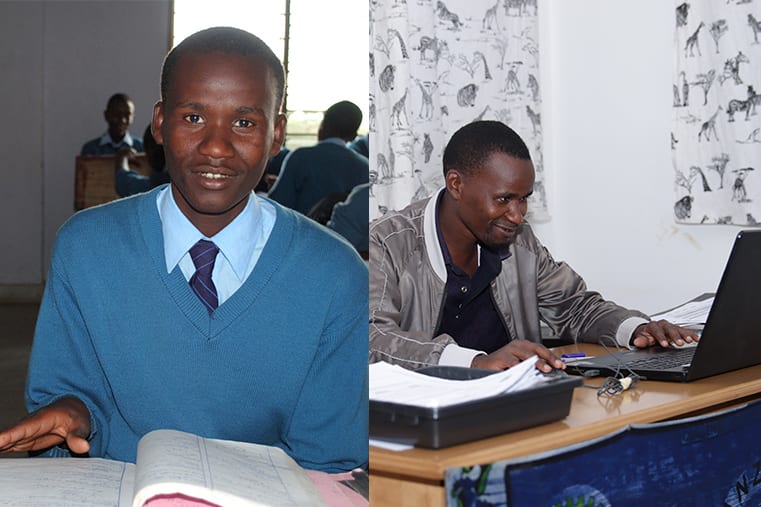
Daudi joined St Jude’s in 2004 when he was in Standard 2. Throughout his school life, he showed a natural aptitude for leadership.
“I’ve always liked taking up leadership roles since I was young. I was Head Boy in Standard 6, Minister for Social Welfare in Form 2 and Minister for Environment in Form 5, so I always loved to lead,” Daudi says with a smile.
Leadership is a prominent skill that St Jude’s promotes amongst its students – nurturing the community-focused leaders of tomorrow.
“During my Community Service Year (CSY), I taught commerce and booking to more than 133 students in one class and I had to teach three streams. Before I completed my CSY, I established a leadership club at the government school; the club is still active, and in my spare time I pass by to check on its progress,” Daudi explains.
He adds, “After I completed my tertiary education in Uganda through Beyond St Jude’s, I wanted to come back and help. When the HR manager called me and said there’s a lot to assist with here at St Jude’s, I didn’t hesitate! I quickly applied for the position and I got the job.”
Daudi’s childhood began living in a two-room, mud home in a rural village on the outskirts of Arusha. He believes if it weren't for his St Jude's education, he would not have had the chance to reach his full potential.
“St Jude’s is a life-transforming place. Personally, if it wasn’t for a free, quality education it would’ve been a far-fetched dream to get my bachelor’s degree in Uganda. Because of St Jude’s, I haven’t had to struggle financially for my education like many of my peers. I’m forever grateful to be part of the St Jude’s family,” Daudi attests.
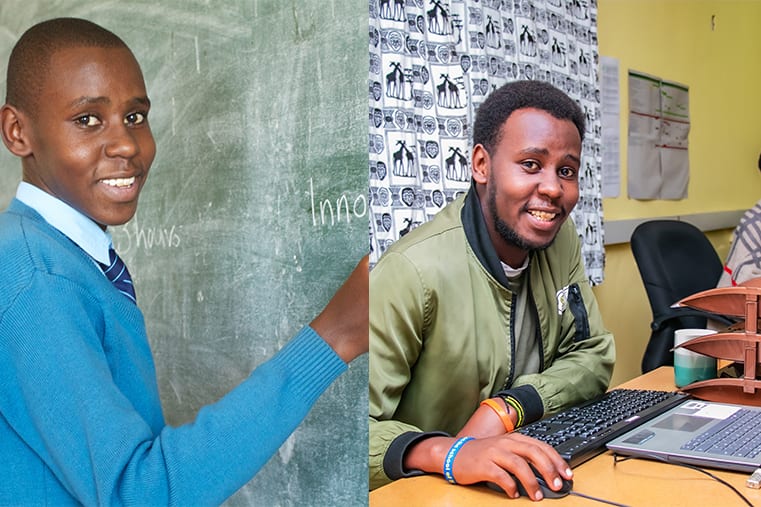
Innocent D joined St Jude’s in 2004 when he was in Standard 1 and completed his final year of secondary school, Form 6, in 2017.
“My St Jude’s experience was amazing because I received everything at school. My only duty was to study. This also helped lift a huge load off my father, and he was able to educate the rest of my siblings," says Innocent D.
Innocent D graduated from university in 2020, and he’s currently working the Beyond St Jude’s team (BSJ); the team who supported him through his higher education. Now, he follows up on the academic progress and social wellbeing of the 292 current tertiary scholars studying in 42 institutions across Tanzania.
“I’m glad to be back. This is my chance to give back and appreciate what the sponsors and donors did for me – helping me get free, quality education from primary through to my higher education. It is my way of thanking everyone for supporting me,” Innocent D explains.
Innocent D, who is no stranger to the BSJ team says, “For my Community Service Year (CSY), I first volunteered at a government school, where I taught history to more than 60 students in one class. Afterwards, I volunteered in the BSJ team for six months. This allowed me to gain experience in both a teaching and office environment."
“I applied for the job after receiving an email from the Alumni team informing me that BSJ was looking for a candidate. It's great to have this chance to help my younger brothers and sisters.”
“Thanks to this job, I am now able to provide for my family and help my father educate two of my siblings who are still in school,” Innocent D adds.
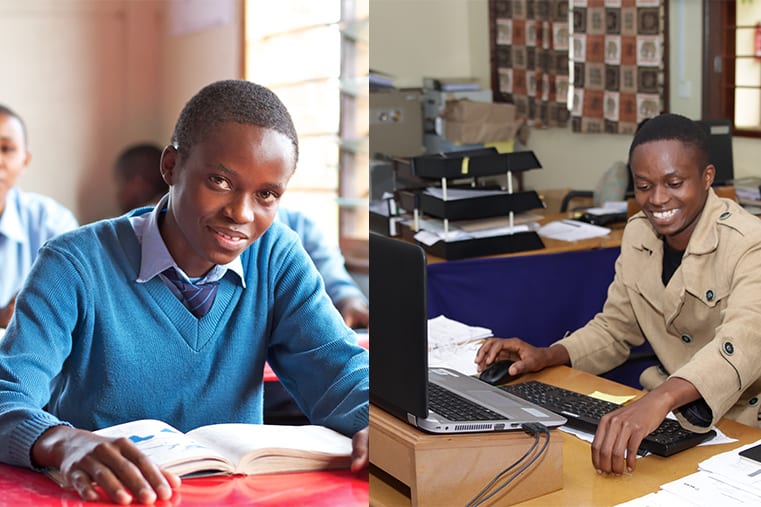
"I remember reading a book called ‘Peter and Jane’ for my entrance exam on St Jude’s Selection Day," says Innocent M with a smile.
Innocent M joined St Jude's in 2004 as a Standard 2 student. After completing Form 6, he went on to pursue higher education in commerce and accounting through Beyond St Jude’s. Now, he’s back working in the Accounts team, receiving generous donations and sponsorships from supporters all of over the world.
“When the position became open in finance, I was volunteering at Smith Campus as a teacher while I waited to officially graduate from the university. I immediately applied, went for the interview and, I got in! I was so happy!” Innocent M recalls.
“Most of my friends either ended their education in Form 4 or opted to do something else… and that could’ve easily been me if it wasn’t for St Jude’s. Now, I’m working here and I’m receiving a salary, my life and my family’s life has changed.”
Daudi, Innocent D and Innocent M are just a few alumni whose lives have been transformed… a true testament to breaking the cycle of poverty through education!
With your support, we can continue to change the story for thousands of students and higher education graduates, creating a pathway out of poverty for the youth of Tanzania.
Loud cheers, claps and laughs can be heard in the hall as the Form 6 graduating Class of 2021 perform on stage one last time. This year, The School of St Jude is celebrating 139 graduates; 75 girls and 64 boys.
In Tanzania, the final two years of secondary school are called Advanced Level (A Level); Form 5 and 6. These Form 6 graduates have now completed their A Level studies and are ready to embrace the next stage of their academic journey… higher education!

Mr Sabas, Headmaster at Smith Campus, begins his speech “This is our seventh class to graduate from Form 6 since 2015, and I am happy to see them reach this milestone.”
“Today we are congratulating the students for the time spent in school, giving them hope and encouraging them on their journey that they are about to take soon after they graduate secondary school.”
He adds, “We've raised good boys and girls. Before they did their final exams, we prepared them well and I am confident in their abilities. My hope is for each one of them to get excellent results.”

William is one of 64 boys completing his A Level studies. William joined St Jude’s in 2018 when he was in Form 5; studying physics, chemistry and biology.
“Before St Jude’s, I was in a government school. The environment and academics there were completely different. If it wasn’t for St Jude’s I don’t think I would’ve reached my goal,” William explains.
"I can’t explain my happiness today. I believe I’ve made my father and my whole family very happy,” he says with a smile.

Tanzania has 4942 O Level secondary schools compared to a mere 762 A Level secondary schools. Only 30% of children in the country are enrolled in secondary education, and about 60,000 students drop out of O Level secondary schools each year, 50% of them girls.
“Female students struggle a lot to complete school,” says Janet, Form 6 graduate.
Janet joined St Jude’s in Standard 1 in 2009. Starting her early education in a government school, she explains the difficulties female students face in achieving their goals, “Girls like myself don’t get to reach this level in a government school because of lack of resources and also because of the societies we come from.”
“Some of my friends dropped out of school at the end of primary and O Level. They are just at home either married, divorced or some with children. I honestly feel like I’m the lucky one to be able to get this opportunity to continue with my studies.”
“I’m looking forward to pursuing a marketing degree in university but for now, I’m excited to start my Community Service Year in the Beyond St Jude’s Program, where I’ll be teaching primary students in a government school,” Janet adds.
The Community Service Year (CSY) is part of the Beyond St Jude’s Program for Form 6 graduates. Graduates volunteer in their first year out of school by teaching in local government schools or in non-teaching placements throughout St Jude’s campuses to give back in appreciation for the free education they received at St Jude’s.

Ready to start her CSY program is Shamsia, who’ll be joining St Jude’s Marketing team.
“I feel so happy today and I’m proud to have completed Form 6,” Shamsia says with excitement.
“Joining the Marketing team at St Jude’s feels great because this field has always been my passion. I’m truly looking forward to learning skills that come with this field before I go off to pursue my degree in marketing,” she adds.
Upon successful completion of their CSY, volunteers are eligible to apply for BSJ tertiary scholarship, enabling them pursue their first higher education qualification specific to their field of interest.
A big congratulations to all the Form 6 graduates for completing this stage of their academic journey. These graduates are changing the status quo, writing their own stories and paving the way to a brighter future for themselves and their families.
By sponsoring a St Jude’s academic scholarship or donating to the school, you are changing the story for a Tanzanian student. You allow St Jude’s to provide free, quality education for students who, due to financial pressures, would likely have joined the three quarters of Tanzanian students who do not finish secondary school.
To show the true impact of your support, this year’s Annual Appeal will feature three St Jude’s stories. Over the coming month, you’ll see these stories in video form, but today, you can get to know alum Judica and students Seuri and Joylina a little better.
Judica’s Story of Transformation
“I’ve achieved my dream to be a business woman.” - Judica, Class of 2015.
Judica is a St Jude’s alum with an amazing story of transformation. As one of the earliest St Jude’s students, Judica’s story is inextricably linked with the school.
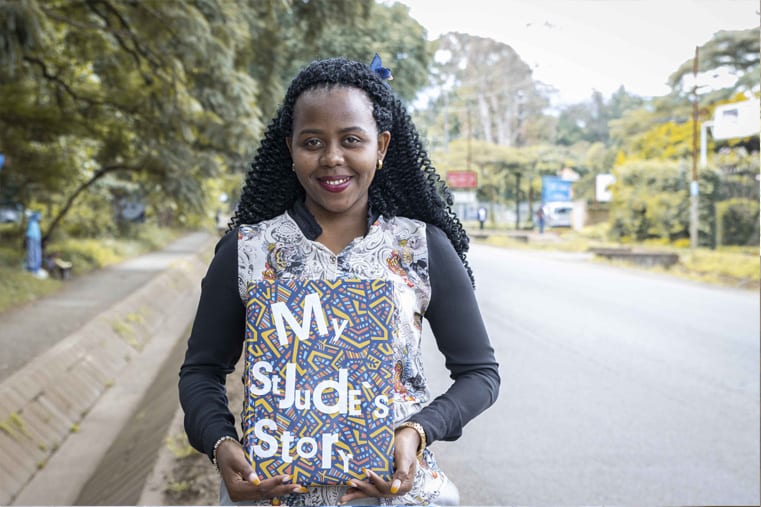
Judica started in Standard 1 at St Jude’s in 2003 when the school had just 120 students. As farmers, Judica’s parents struggled to afford school fees for her and their eight older children. After 13 years of free, quality education and serving as the school’s head girl, she graduated with the Class of 2015, our inaugural graduates.
Following graduation, Judica was quick to apply for the Beyond St Jude’s (BSJ) Program and spent a year volunteering as a book-keeping teacher in a government school as part of the Community Service Year. Then, Judica left home to study a Bachelor of Commerce, Banking and Financial Services at the University of Dar Es Saalam supported by BSJ. In 2019, Judica was one of the very first St Jude’s university graduates and today she is employed full-time at a national bank in Arusha.
Seuri’s Story of Determination
“I want to become a doctor to help my community, as there are not many doctors here.” - Seuri, Form 4.
Seuri’s story is a tribute to his determination. Seuri attended a government primary school in his village, which lacked electricity, water and learning resources. Despite this, Seuri was determined to get an education.
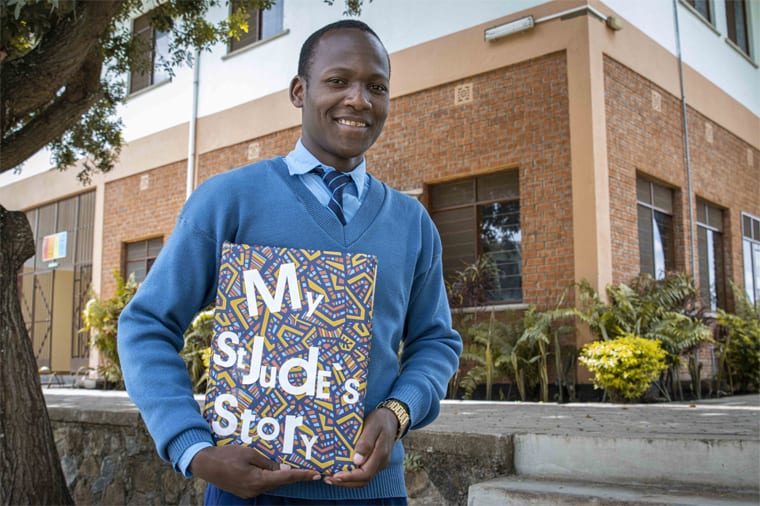
Seuri’s determination lead him to achieve great results in his Standard 7 National Examinations and earned him an academic scholarship for secondary school at St Jude’s. Seuri boards at St Jude’s during term time, but he returns home to his family boma (a traditional Maasai home) during holidays. Seuri’s father has two wives; he lives with his mother and four siblings as well as his father’s first wife and her six children.
After almost four years at St Jude’s, Seuri is more determined than ever. With quality resources, highly-trained teachers and a stable boarding environment at St Jude’s, Seuri has learnt volumes and is determined to achieve the results he needs to study medicine and become a doctor.
Joylina’s Story of Hope
“I want to be a nurse so I can help my family, friends and all the people who are sick.” - Joylina, Standard 2.
Joylina only started at St Jude’s in 2020, but her St Jude’s academic scholarship has already given Joylina and her mother hope for the future.
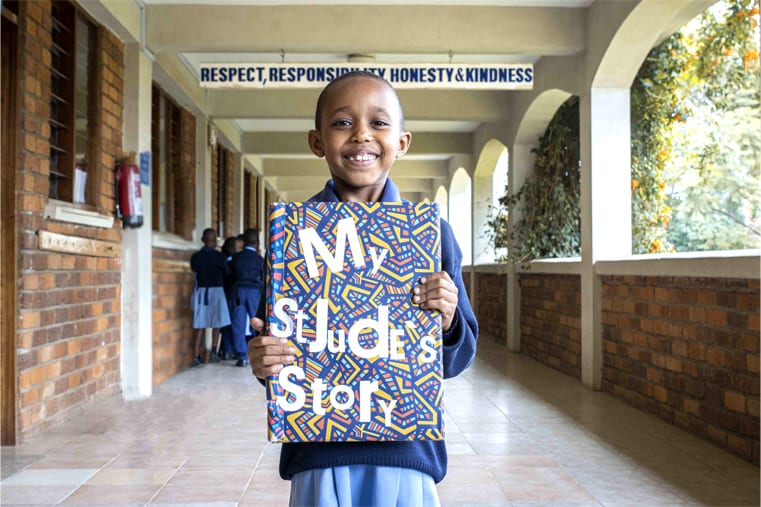
Joylina, her mother and her sisters live in a single room where they moved following the death of Joylina’s father in 2018. When she heard about St Jude’s, Joylina’s mother decided to bring Joylina to a Student Selection Day. She was overjoyed when Joylina was offered a scholarship.
During the last 18 months at St Jude’s, Joylina has been an enthusiastic learner and become one of the top students in her class. Like her classmates, Joylina receives uniforms, resources, bus transport and highly-trained teachers. In addition, she receives special diet provisions as she was found to be undernourished. With a carefully planned diet, she has been able to gain weight and her mother is pleased that Joylina now falls sick less often and has more energy.
Joylina especially likes healthcare class as she hopes to be a nurse when she finishes school.
Joylina, Seuri and Judica are proof that when you support a story, you can change the world. Generous sponsors and donors have changed the story for them and for thousands of others of St Jude’s students.
Be sure to follow us on social media and hear more from these featured students over the next month as they share their stories.
“If a person can speak publicly, without any fear, then she can change the situation that we face as a country.”
So says Noreen, a confident Form 4 student from St Jude’s Girls’ Secondary School. Recently, Noreen made a moving speech at the East Africa Youth and Peace Conference, with an important message about bullying and showed hundreds of audience members what St Jude’s students are capable of.
Students and staff at St Jude’s share Noreen’s thoughts on the importance of public speaking. From the earliest days of Standard 1, students are encouraged to practise their English by speaking in front of the class. As students grow older, opportunities for public speaking arise more and more frequently. This year, St Jude’s held the first whole school public speaking competition, which revealed a wealth of talent.
Speaking From The Heart: The winners of St Jude’s recent public speaking competition.
So, when Madame Elizabeth, Head of Languages Department at St Jude’s Girls’ Secondary School, received an email inviting our students to speak at the East Africa Youth and Peace Conference, her only difficulty was choosing just one student.
In the end, she chose five; Noreen, Mariam, Miriam, Irene and Irene. While only Noreen could speak at the conference, the other four students collaborated, in true St Jude’s spirit, to prepare the perfect speech.
“We worked as a group. We shared ideas. We shared the research. We joined up and worked together,” explains Mariam.
The students also had the advantage of Madame Elizabeth’s guiding hand.
“She would say, ‘How about you add this?’ Or, ‘Think about this.’ Or, ‘How can you make it better?’ ” Irene explains.
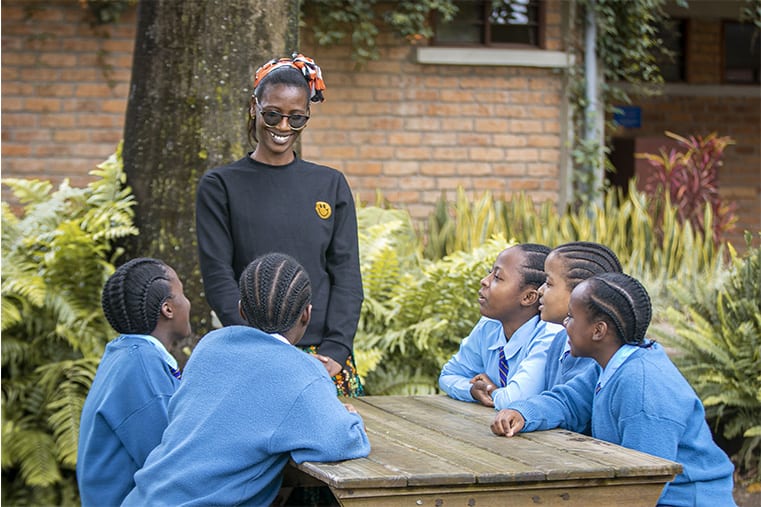
In the end, the students created a speech which examined the impacts of bullying and made suggestions about how to reduce it in schools. The issue is particularly close to the students’ hearts.
“Bullying leads to students dropping out of school because they don’t get the peace they require at school,” Irene states.
On the day of the conference, the students were in good company with hundreds of guests from across East Africa, including Tanzania, Kenya and Mozambique.
“There were so many people in that hall. There were other students, college students and industry leaders,” Mariam recalls.
Finally, it was Noreen’s turn to speak, and she did her school and her classmates proud. She chose to speak without notes, and delivered her well-prepared speech from the heart.
“I was observing while Noreen was giving her speech. I was trying to look at the expression on everyone’s faces,” laughs Irene.
“The reaction was really amazing. Nobody expected that a young girl could stand in front of thousands of people and speak like that,” says Mariam with pride.
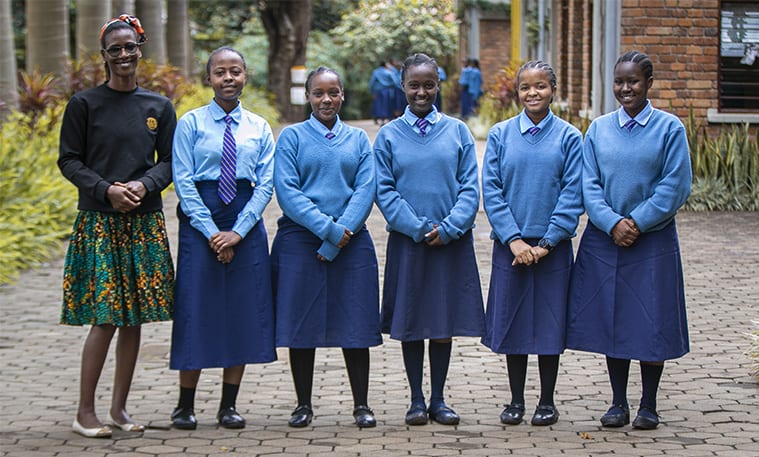
For Noreen, the successful speech was the culmination of years of practice at St Jude’s.
“It’s because I have real experience of it. Because we have public speaking at school it’s easy to speak publicly, even to thousands of people,” she states.
Madame Elizabeth was happy to see her students address such a large audience.
“I was so proud of all the students. It was a wonderful day,” she says with a smile.
All the students plan to continue with public speaking, both at school and afterwards, and agree that it’s a great life skill to take into their chosen careers.
“To be president, you have to be able to speak in front of many people and be confident,” beams Mariam.
Public speaking has a crucial role at St Jude’s. Our vision of an educated community of moral and intellectual leaders fighting poverty in Tanzania, can only become a reality if our students have the confidence to share their ideas. Students like Noreen, Irene, Miriam, Mariam and Irene show that St Jude’s is well on the way to realising that vision.
“Ooooh look it’s a troop of baboons!” Theresia, a Form 2 student, shouts with excitement.
Theresia and her fellow members of the girls’ school Student Government, accompanied by teachers, set off early for an exciting adventure – an excursion to Lake Manyara National Park!
Driving through a dense, evergreen forest of the national park that is situated between the Arusha and Manyara regions in Northern Tanzania, students were thrilled to spot wild animals: zebras, antelopes, wildebeest, elephants, giraffes, monkeys and baboons.
As a reward for their outstanding leadership performance, the excursion aimed to enable students to understand, learn from, and examine the natural world.
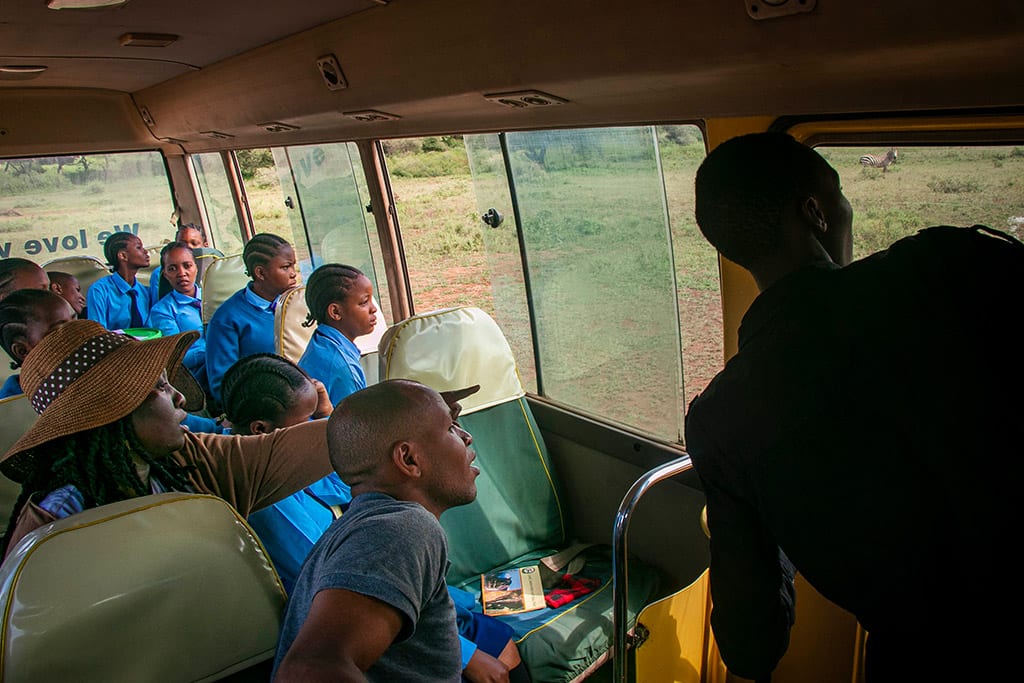
“The reason we planned this trip is to first show appreciation for their time spent as leaders in the school government body and second, to motivate and empower the students with leadership skills,” explains Ms Judith, St Jude’s Girls’ Secondary School Deputy Headmaster – Operations.
The outgoing Students’ Government at the girls’ secondary school retired from their duties early this month, paving the way for the new government to be sworn in soon.
The Student Government is elected by fellow students each year. Candidates from different year levels who would like to be part of the government collect and fill forms.
Once the forms are returned, the names are sorted and put into different posts that the candidates are contesting for. Thereafter candidates get interviewed by teachers and other reigning government leaders before they start seeking votes from their peers.
With complete transparency, elections are highly supervised by teachers and other incumbent student leaders. Students are given forms that they cast in a ballot to vote for their favourite candidates in situated poll stations. The votes are later collected from the poll stations and submitted to the election committee counting and announcing the winners.
The student government body at St Jude’s is run entirely by students. They represent students’ voices, follow up on students’ welfare and discipline as well as the students’ academic progress.
“The Student Government is a bridge between students and teachers. We want to show this group that we value their contribution. We also expect them to become great ambassadors and mentors to the incoming student government,” Ms Judith adds.
“We chose Lake Manyara National Park because of its unique features and the abundance of animals that live in groups like elephants, baboons and antelope families. I believe through animal behaviour, the students will gain inspiration, and I hope they’ll use this time to reflect on their leadership skills,” says Ms Judith.
The Student Government comprises of members from different year levels led by a head girl, a head boy, and a general secretary. The remainder of the members, called prefects, oversee other disciplines such as academics, discipline, security, and safety.
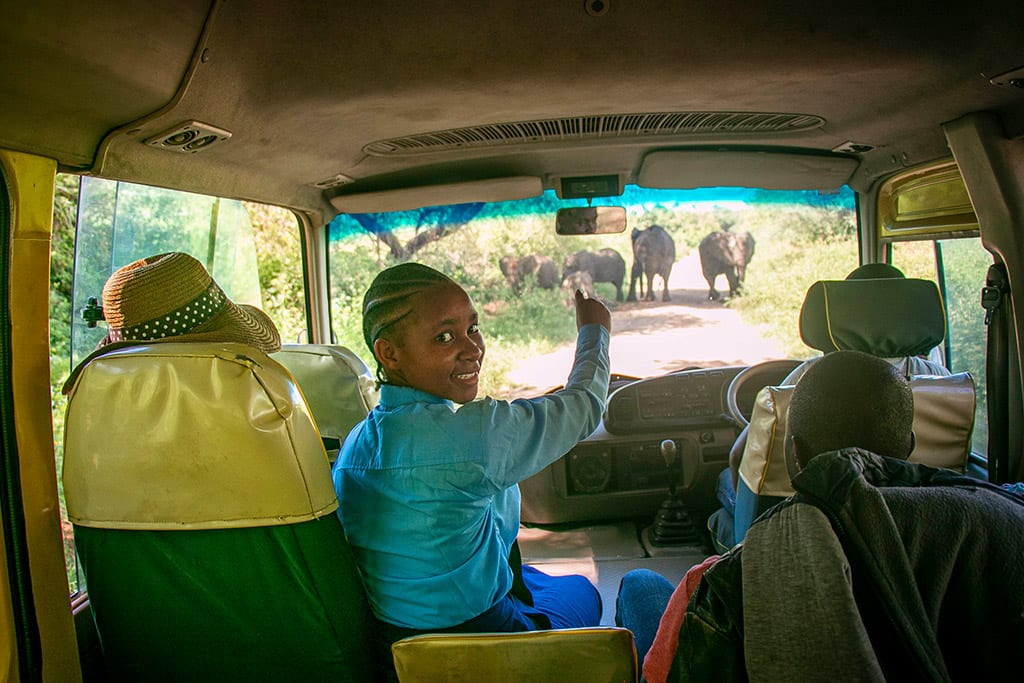
Theresia, who served as a security prefect in the Student Government, was wide-eyed with anticipation during the excursion.
“What I learnt from this motivational trip is animal families, behaviour and their heirarchical roles. As a security prefect I had so many questions about how animals defend themselves and it was interesting to know how each animal family has its own way of defending,” Theresia shares.
The students were surprised to learn that baboons have different hierarchies within their troops, and its members are highly coordinated, whether it be for feeding, mating, or grooming.
“I enjoyed learning about baboons and how they behave. I was so intrigued when the tour guide was talking about how social these animals are and how they work together to look for food and protect each other,” says Mwasiti, one of Theresia’s Student Government peers.
“This trip has taught me that through animals we can learn a lot. For example, a big lesson I got is from zebras. These animals stand side-by-side but face opposite directions, one resting its chin on the back of the other, an act that allows them to groom each other while keeping an eye out for predators. To me this shows cooperation and I believe this is an important skill if you want to be a good leader,” Mwasiti reflects.
Leadership is one among many skills that St Jude’s instils into the students, which will help them lead their families and communities with respect, responsibility, honesty and kindness and become future leaders of Tanzania.
